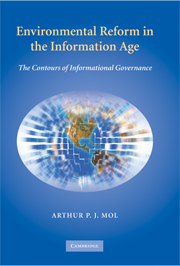3 - Social theories of environmental reform
Published online by Cambridge University Press: 03 November 2009
Summary
From environmental crises to environmental reform
The Information Society literature and the studies on the Information Age paid only marginal attention to environmental questions. During the 1970s and 1980s, this ‘environmental omission’ can be seen as representative for the wider social sciences, rather than an anomaly of this particular literature. But ‘the environmental question’ was not completely absent from the social sciences. During the late 1960s, and especially the 1970s – that is, parallel in time to the emerging Information Society debate – several social sciences witnessed the emergence of relatively small environmental subdisciplines: within sociology, political sciences, economics, and later also within anthropology and law. Strongly triggered by social developments in Western industrialised societies, social scientists started to reflect on a new category of phenomena: the changing relations between nature and society and the reflection of modern society on these changing relations.
In retrospect, the framing of environmental questions within sociology and political sciences during the 1970s and 1980s was of a particular nature. The emphasis was primarily on the fundamental causes of environmental crises in Western industrialised society and the failure of modern institutions to adequately deal with these environmental crises. Environmental protests and movements, state failures, the capitalist roots of the environmental crisis, and environmental attitudes and (mis)behaviour were the typical subjects of environmental sociology and political sciences studies in the 1970s. Many of these studies were strongly related to neo-Marxist interpretation schemes (cf. Enzensberger, 1973; Schnaiberg, 1980; Pepper 1984), and even today neo-Marxism is a powerful and far from marginal explanatory theory in environmental social science research.
- Type
- Chapter
- Information
- Environmental Reform in the Information AgeThe Contours of Informational Governance, pp. 55 - 79Publisher: Cambridge University PressPrint publication year: 2008



